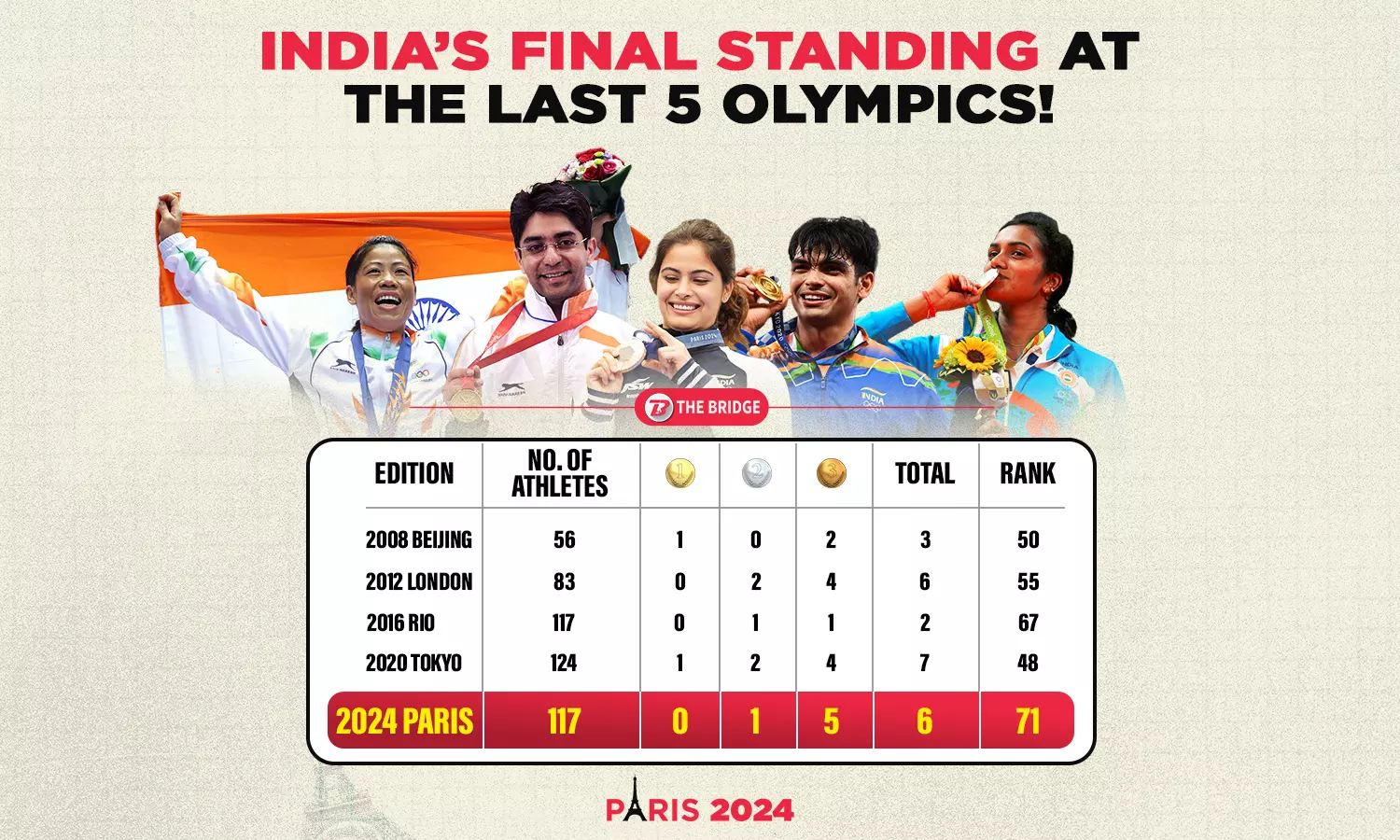Olympics
6 medals and yet 71st on the Olympics medal tally: India's position explained
Despite five bronze and one silver, India's position on the medal tally is their joint worst finish at the Olympics when they have won at least one medal.

India was placed 71st in the medal tally at the Paris Olympics.
The Paris Olympics have come and gone.
For over a fortnight, the city brought to the world unparalleled entertainment and a range of emotions, courtesy of the finest athletes from across the planet.
India sent 117 of its finest, all highly trained and capable. But the returns were underwhelming.
Five bronze and a silver medal were all that India was able to bring back from Paris, one short of the seven medals the country won at the 2020 Tokyo Olympics.
While the target was to get into the double digits in the medal tally at the Paris, a combination of misfortunate and disappointing performances from medal hopefuls resulted in as many as six fourth-place finishes.
What's more, the medals tally will show that India has finished 71st overall, their joint-worst position in the Olympics (when at least one medal was won).
Interestingly, India had finished at the 71st position as well in both the 1996 Atlanta and 2000 Sydney Games when the country had won just one medal in both instances.
Why did India finish 71st?
India's six-medal tally was the 38th highest in terms of the number of medals won at the Paris Olympics. And yet, they were placed 71st in the medal tally.
But why?
The reasoning is that a gold medal is the most prestigious of all.
In the Olympic medal tally, a gold medal is the most coveted, followed by the silver medal and the bronze medal.
And naturally, a country that wins more golds and silvers is ranked much higher, even if its total medal tally is low.
Take the case of the United States and China for instance.
Both finished the Games with 40 gold medals at the Olympic Games in Paris but the United States is placed at the top of the medals tally because they have secured 17 more silver medals than China.
On the converse, a country with a high number of medals but most of them being bronze will rank them lower since the medal table gives precedence to gold and silver medals.
Great Britain is an example of this scenario.
With 65 medals in all, they were the country with the sixth most aggregate medals at these games. And yet, they were placed seventh on the final medal tally behind Australia, France, and Netherlands owing to their possession of 14 golds which paled in comparison to the 18, 16, and 15 gold medals that the other three nations had won.
At the 1996 and 2000 Olympics, India finished with just one medal each, both bronze medals. And despite bagging six medals at the Paris Olympics, due to a large portion of the medals being bronze, the ranking on the medal tally is naturally lower.
A good comparison can be made with Ireland's case as well.
The Irish contingent finished with seven medals, just one above the Indian tally. But four of their medals were gold and as a result, they finished 19th and well above India in the tally.
Norway too, finished with just two more medals than India but out of the eight medals they secured, four were gold and one was a silver and hence, they finished 18th in the final medals tally.
Meanwhile, Slovenia won just three medals at the Paris Olympics, but two of those were golds and one was silver, and as a result, they finished in the 34th position in the final medal standings.
Interestingly, India's Tokyo Olympic campaign had them placed 48th in the medal tally despite winning just seven medals. And this was due to Neeraj Chopra's gold and two other silver medals making up the seven-medal haul, naturally a more potent medal combination.
Any medal is an incredible achievement, but undoubtedly, a gold medal is the most valuable of them all and this impacts a nation's position on the medal tally.
And as India continues its pursuit of achieving double digits in terms of medal haul at the Olympic games, the lessons gleaned from the medal tally should perhaps point to the sole aim of bagging gold while not resting on the laurels or even aspiring for a bronze.
